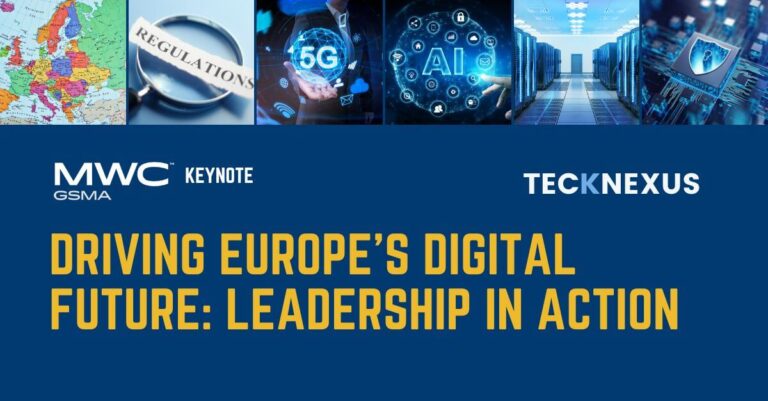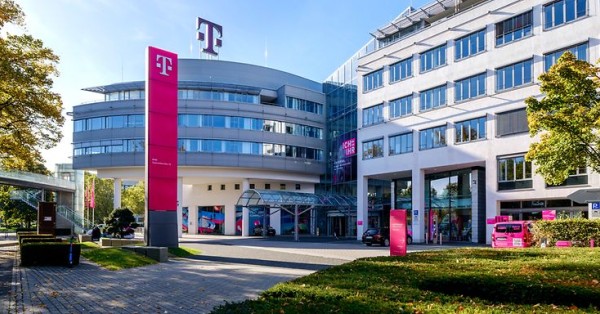Driving Europe’s Digital Future – Leadership in Action
The rapid acceleration of digital technologies is reshaping industries, economies, and societies across Europe. As the continent aims to solidify its position as a global leader in the digital era, challenges such as infrastructure expansion, regulatory coherence, sustainability, and competition with other global digital giants remain at the forefront.
At MWC 2025, the keynote session “Driving Europe’s Digital Future – Leadership in Action” brings together some of the most influential figures in the telecom industry to discuss the strategies needed to propel Europe’s connectivity landscape forward.
This session will highlight the pressing need for stronger digital infrastructure, innovative partnerships, and a unified regulatory approach that fosters competition while ensuring sustainability and inclusion.
Keynote Speakers:
- Margherita Della Valle, CEO, Vodafone
- Christel Heydemann, CEO, Orange
- Tim Höttges, CEO, Deutsche Telekom
- Marc Murtra, Chairman & CEO, Telefónica S.A.
- Moderator: Shaun Collins, Executive Chairman, CCS Insight
The State of Europe’s Digital Landscape
Europe stands at a critical juncture in its digital evolution. While significant progress has been made in network deployment, spectrum allocation, and digital transformation, challenges persist. The region is facing increasing competition from global technology leaders in North America and Asia, necessitating a strong and unified response to ensure leadership in emerging technologies.
The Digital Decade Policy Programme 2030 outlines ambitious targets to strengthen connectivity, cybersecurity, and technological sovereignty. However, realizing these goals requires a multi-stakeholder approach involving industry leaders, policymakers, and digital innovators. Investment in next-generation infrastructure, including 6G and quantum computing, must be coupled with regulatory clarity to create a competitive and secure digital ecosystem.
Furthermore, Europe must leverage public-private partnerships to accelerate digital adoption while ensuring inclusivity. The role of telecom operators, cloud providers, and AI-driven solutions will be pivotal in shaping the future. Companies like Huawei, Nokia, and Ericsson are already working closely with governments to bridge digital gaps, enhance AI research, and establish sovereign cloud infrastructure.
1. Connectivity Challenges and Infrastructure Development
Europe has made significant strides in broadband expansion, 5G deployment, and network modernization. However, gaps remain in rural connectivity, cross-border infrastructure, and the deployment of fiber-optic networks. The EU’s Digital Decade Policy Programme 2030 sets ambitious targets, but achieving them requires collaborative efforts between governments, telecom operators, and technology providers.
Key initiatives include:
- 5G and Beyond: The push for widespread 5G coverage and early-stage 6G research.
- Fiber Network Expansion: The need for deeper fiber penetration in underserved regions.
- Satellite and Low-Earth Orbit (LEO) Integration: Leveraging satellite technology to enhance rural and remote connectivity.
- Smart City Connectivity: Advancing urban digitalization through IoT-enabled networks and integrated smart city solutions.
- Cross-Border Digital Corridors: Strengthening interconnectivity between European nations through seamless cross-border network infrastructure.
2. Regulatory Coherence and Digital Sovereignty
Europe’s regulatory landscape is evolving to ensure fair competition, data privacy, and digital sovereignty. The Digital Markets Act (DMA) and the Digital Services Act (DSA) aim to curb monopolistic practices while fostering a level playing field for all market participants. However, industry leaders emphasize the need for regulatory clarity and agility to prevent bureaucratic slowdowns that could hinder innovation.
Key regulatory challenges include:
- Harmonizing telecom policies across EU member states to streamline cross-border operations.
- Developing a unified spectrum strategy to support 5G and future 6G networks.
- Ensuring fair competition while promoting innovation in a market dominated by global tech giants.
- Data Localization and Security Compliance: Establishing robust frameworks to protect user data and enhance cybersecurity across borders.
- European Cloud Infrastructure Standards: Encouraging the development of European-based cloud services to reduce dependency on non-EU providers.
3. Europe’s Leadership in Open RAN and Cloud Infrastructure
One of Europe’s biggest opportunities lies in the advancement of Open RAN (O-RAN) technology, which promotes vendor diversity, reduces dependency on a few major providers, and encourages local innovation. European operators, including Vodafone, Orange, and Telefónica, are pioneering Open RAN initiatives to build more flexible and cost-efficient networks.
Additionally, cloud infrastructure and edge computing are critical for Europe’s data sovereignty. The push for a European Cloud and AI Development Act aims to bolster regional cloud service providers and reduce reliance on foreign tech giants.
- Federated Cloud Networks: Establishing a pan-European cloud ecosystem to enhance digital sovereignty.
- Quantum-Safe Encryption: Preparing cloud and telecom networks for the post-quantum security era.
- Distributed Edge Computing: Advancing edge-based solutions to enable ultra-low-latency applications across industries.
Strategic Priorities for a Digitally Competitive Europe
To maintain global leadership in digital technologies, Europe must adopt a forward-thinking approach that not only prioritizes connectivity but also fosters a robust innovation ecosystem. A comprehensive strategy must encompass AI, blockchain, cybersecurity, and green technology to drive growth and competitiveness.
Investments in digital skills, research, and technology-driven entrepreneurship are crucial to ensure sustained economic development. The EU has introduced several initiatives, including the Competitiveness Compass and the AI Continent Action Plan, to streamline digital transformation. However, execution at scale will require collaborative governance, ensuring seamless integration between regional and national efforts.
Key areas of focus include:
- Advancing AI and Machine Learning: Strengthening AI-driven innovations in industries such as healthcare, finance, and telecommunications.
- Boosting Semiconductor Capabilities: Implementing the Chips Act to enhance Europe’s semiconductor manufacturing and reduce dependence on foreign markets.
- Digital Skills Development: Expanding training programs to prepare the workforce for next-generation digital roles.
- Strengthening Cyber Resilience: Enhancing security measures to protect Europe’s critical digital infrastructure.
- Expanding High-Performance Computing: Supporting research into quantum computing and supercomputing networks.
4. Digital Inclusion and Bridging the Digital Divide
A digitally empowered Europe must ensure that all citizens have equitable access to high-speed internet, digital skills training, and affordable devices. Several initiatives are leading this effort:
- EU’s Connecting Europe Facility (CEF): Funding high-speed broadband expansion in rural areas.
- Public-Private Partnerships: Telecom operators collaborating with governments to bridge digital divides.
- Education and Digital Literacy Programs: Upskilling programs to prepare Europe’s workforce for an AI-driven economy.
- Affordable Device Initiatives: Providing subsidized digital devices for students and low-income populations.
- Accessible Digital Services: Ensuring government and healthcare services are fully digitized and accessible to all citizens.
5. Sustainability and Green Telecom Initiatives
The telecom industry plays a crucial role in Europe’s Green Deal Industrial Plan, focusing on energy-efficient infrastructure, circular economy models, and carbon-neutral operations. Industry leaders at MWC 2025 will discuss:
- Green Data Centers: Reducing energy consumption in cloud computing.
- Eco-Friendly Network Equipment: Deploying energy-efficient 5G and fiber-optic networks.
- AI-Driven Smart Grids: Leveraging AI to optimize network energy usage.
- E-Waste Management and Circular Economy: Developing sustainable recycling programs for telecom hardware.
- Renewable Energy Integration: Enhancing telecom networks’ reliance on solar, wind, and other renewable energy sources.
6. Cybersecurity and Data Governance
As digital infrastructure expands, so do cybersecurity threats. Europe’s Cyber Resilience Act and Data Governance Act aim to protect critical telecom networks while fostering cross-border data sharing frameworks that respect privacy regulations such as GDPR. The industry’s key concerns include:
- Strengthening network security against cyberattacks.
- Promoting secure and interoperable digital identity systems.
- Ensuring compliance with global data protection standards.
- Real-Time Threat Intelligence Sharing: Encouraging collaboration among EU member states for proactive cyber defense.
- AI-Powered Security Operations: Automating threat detection and response using AI-driven solutions.
7. AI, Automation, and the Future of Telecom Innovation
Artificial Intelligence (AI) is revolutionizing network management, customer service, and predictive analytics. However, integrating AI into telecom operations requires regulatory oversight to ensure ethical AI deployment. Key discussions at MWC 2025 will focus on:
- AI-Driven Network Optimization: Enhancing efficiency and reducing downtime.
- Ethical AI Regulations: Ensuring transparency and accountability in AI-powered telecom solutions.
- The Role of AI in Digital Transformation: How AI can support automation, security, and personalized services.
- AI in Telecom Fraud Detection: Leveraging AI to combat fraud, spam, and cybersecurity threats.
- Personalized AI Customer Support: Enhancing telecom user experience through intelligent virtual assistants.
Conclusion: A Unified Vision for Europe’s Digital Future
With a clear strategy focused on infrastructure expansion, regulatory coherence, digital inclusion, and sustainability, Europe is poised to lead the next phase of global digital transformation. By embracing collaboration, fostering innovation, and committing to greener and more inclusive technologies, the continent can realize its vision for a connected, competitive, and sustainable digital future.
Session Moderators
Shaun Collins | CCS Insight, Executive Chairman
Session Speakers
Margherita Della Valle | Vodafone, CEO
Christel Heydemann | Orange, CEO
Tim Höttges | Deutsche Telekom, CEO







































